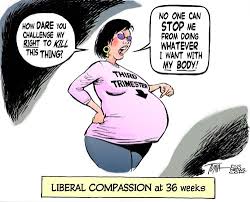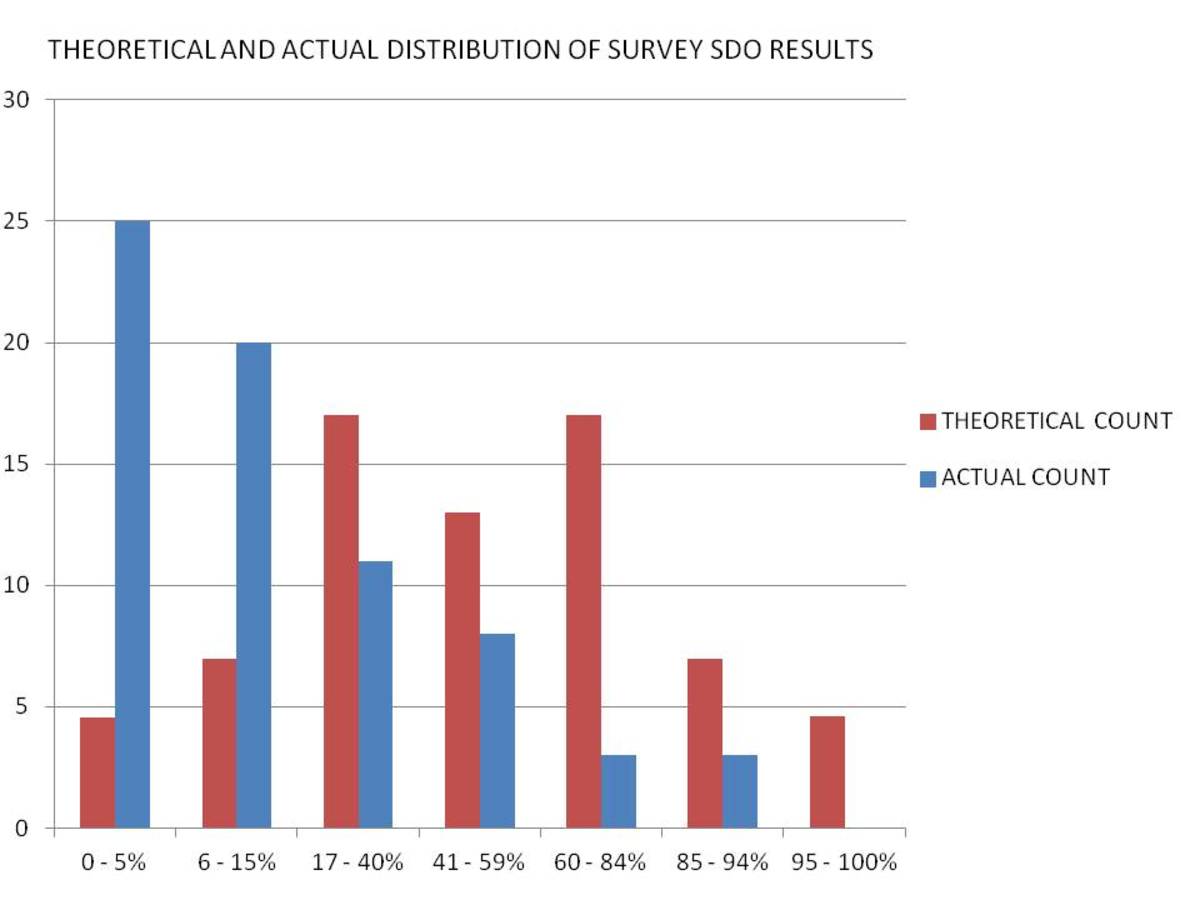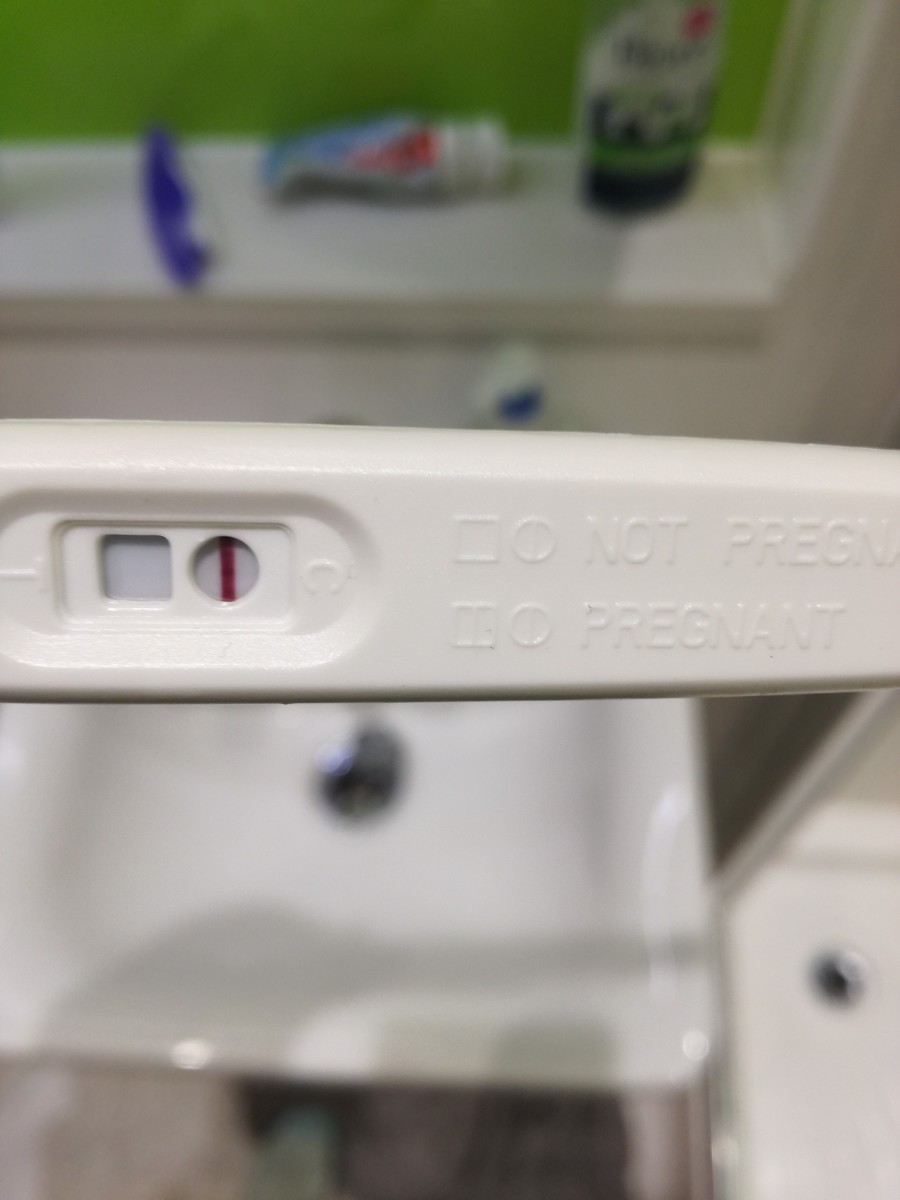Why Conservatives are Wrong on Abortion
Pro-Lifers at a Rally

The picture below, that I have titled "Liberal Compassion, Conservative Ideology?" presents one with a conundrum that only ideological rhetoric can produce; Is it possible that a woman, who, pregnant at the third trimester, would actually choose to terminate her pregnancy? It is possible, but the cartoon below overlooks the reasons why a woman would choose such a course, such as issues regarding the mother's issues health. Yet another example of what happens when your ideology fits inside a cartoon.
Liberal Compassion, Conservative Ideology?

Whenever pro-lifers present their views regarding abortion rights, you hear a lot of the same arguments. Here are a few of the more common arguments against abortion;
- Abortion is a crime. It is committing murder against unborn babies, who deserve to be protected under the same laws as adults.
- Some scientific studies show that fetuses feel pain, which means that the procedure is not only destroying an unborn life, but is doing so tortuously.
- Some very famous people, many alive today, as well as historical figures of great value to some, were still in the womb once, and the world is filled with examples of women who chose to have them, instead of having an abortion. Some of these are wonderful success stories.
Conservatives rightly cringe at the idea of ending a life before it has a chance to begin. And none of the views outlined above are the wrong views. On the contrary, they are perfectly legitimate reasons to be doubtful of abortion. Conservatives have taken the issue on in many state and local legislatures, especially following the momentous Roe v. Wade decision by the Supreme Court, resting their hopes on legislation that would restrict, as much as possible, a woman's access to abortion. The three arguments presented above by the Pro-Life movement implies that the issue is, to a very great extent, a question of morality. Conservatives ask the question, "Is ending an unborn life moral?" Their answer to this question is a resounding "no."
Both sides agonize over abortion. Liberals do not want to advocate for the "murder" of unborn babies. But liberals are largely pro-choice, having decided that, at the end of the day, a woman should be free to make such a personal decision herself without state or federal involvement. Liberals therefor oppose conservative attempts to restrict access to abortion, or to limit the legal abilities of abortion providers, such as Planned Parenthood. The result is that Red states largely have tougher laws on abortion, while Blue states are more permissive regarding abortion. It is an impasse, with no apparent conclusion any time soon.
Conservatives deeply disagree with the momentous Roe v. Wade decision. As a result, they have advocated policies that, while working within the framework of that decision, have the intent to limit abortions as much as possible. However, while the intent of those policies are admirable, the effect they would have are actually the opposite of the ones intended.
We know this to be true, because there is historical precedent. In the early 20th century, 150,000 abortions occurred annually in the United States, and one out of every six of these ended in a woman's death. Laws in the U.S and England limiting a woman's access to abortion had little success with middle and upper class women, who could still obtain access to the procedures commonly used for it, though this was often very expensive. For poorer women, abortions were more dangerous. There was no guarantee that such illegal procedures would be conducted with sanitary equipment, under sanitary conditions. Such laws also created ripe conditions for charlatans to use herbal or chemical concoctions as a method of abortion. In one incident in 1898, after a number of miscarriages in Sheffield, England, had been blamed on lead from the water pipes, a woman admitted to using diachylon, a lead containing substance, as an abortifaciant (An abortifaciant one among any of the methods of abortion). An investigation into the activities of an abortionist in Alberta revealed that his abortifacient concoction allegedly contained Spanish fly.
Such methods are now out of fashion, largely because, for many women at least, abortion is a legal, if questionable, option. Abortion laws have allowed many people to undergo abortions that are conducted under the highest sort of professionalism, and under the best sanitary conditions. At the very least, legal abortion clinics can be regulated and inspected to ensure that they are safe.
Conservatives take regulation to an extreme. They have, in word and in deed, made it plain that they consider abortion to be a moral wrong, and their policies regarding abortion seek to apply these morals in real life. Conservatives ignore the implications of making abortion too hard for some women to procure legally. Through policies that limit abortions, conservatives risk driving abortion procedures underground, where it cannot be regulated by any law or inspected by any state or federal agency: where it would be dangerous and possibly lethal to those seeking an abortion.
Conservatives not only oppose abortion, but they also oppose contraception for largely religious reasons. While no one, conservative or liberal, opposes contraception in practice, conservatives chafe at being asked to pay taxes which allow other, less well off people greater access to contraception. Conservative business owners oppose being required to add contraception to their employees health plans. Conservative religious institutions resent having to provide contraceptive services which go against their beliefs. Contraception and abortion are two issues that go hand in hand. Put into effect, policies that increase access to contraception would have the effect of decreasing the demand for abortion. After all, no woman can have an abortion without having been pregnant in the first place.
Conservatives have failed to accept that they cannot have it both ways; either they increase contraceptive services to negate abortions, or they support greater abortion access to negate contraception, or they put an end to both and let the chips fall where they may. Liberals at least have made up their minds on the subject.








